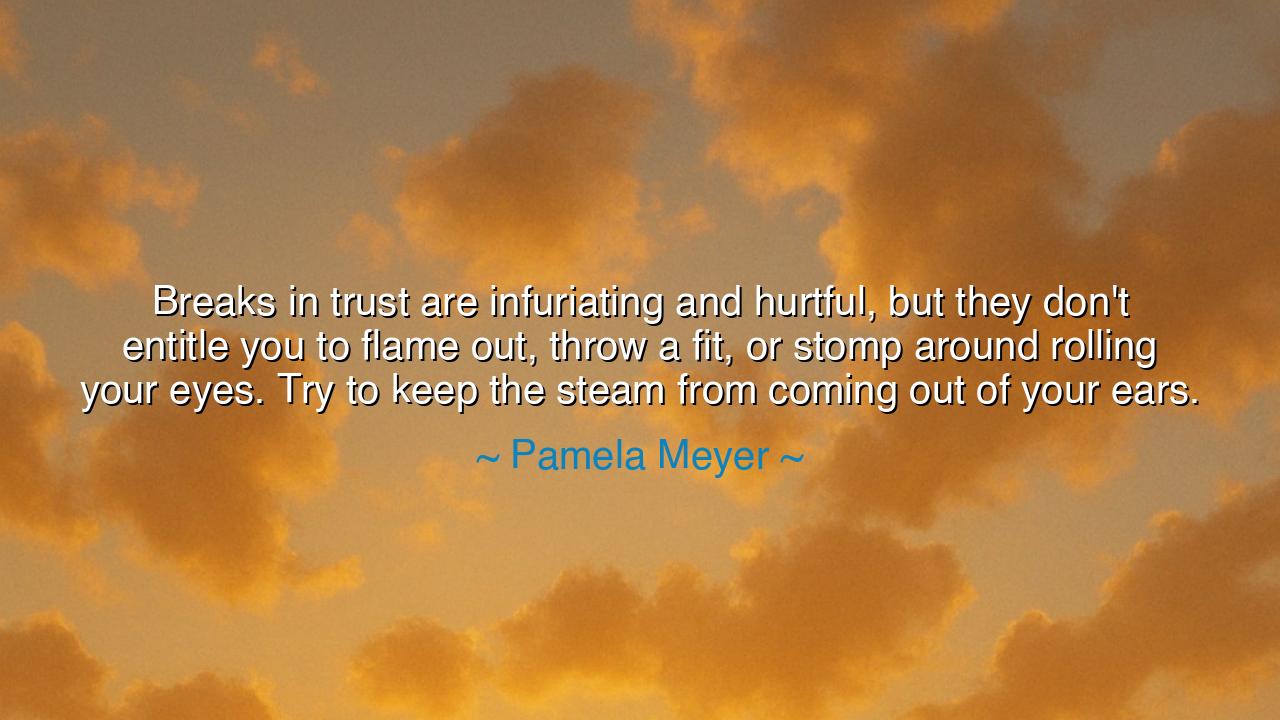
Breaks in trust are infuriating and hurtful, but they don't
Breaks in trust are infuriating and hurtful, but they don't entitle you to flame out, throw a fit, or stomp around rolling your eyes. Try to keep the steam from coming out of your ears.






Hear now the words of Pamela Meyer, seeker of truth and revealer of deception: “Breaks in trust are infuriating and hurtful, but they don’t entitle you to flame out, throw a fit, or stomp around rolling your eyes. Try to keep the steam from coming out of your ears.” In these words lies a wisdom both practical and profound. For she reminds us that though the wound of betrayal burns hot, the response of rage does not heal—it only deepens the scar. The teaching here is not to deny pain, but to master it, to keep dignity even in the fire of disappointment.
Trust, once broken, cuts deeper than any blade. It is the silent agreement that allows people to walk side by side, to share their lives without fear. When it is betrayed, the heart cries out for justice, for revenge, for release in the form of anger. Yet Meyer, with the voice of reason, warns us: do not let fury seize the throne of your spirit. To “flame out” may satisfy for a moment, but it leaves only ashes, and no bridge is rebuilt from ashes.
Consider the tale of Abraham Lincoln. During the Civil War, he was often betrayed by his generals, who failed him through arrogance or incompetence. It would have been easy for him to explode in wrath, to dismiss them in rage, or to let anger cloud his judgment. Yet Lincoln mastered his temper, choosing patience and quiet resolve. His calm steadiness allowed him to hold the Union together when fury might have shattered it. His example reveals the truth: by restraining anger, one preserves strength; by mastering the self, one masters the moment.
Pamela Meyer’s counsel also echoes the wisdom of the ancients. The Stoic philosophers taught that anger is a fire that consumes the one who carries it more than the one who caused it. To keep “the steam from coming out of your ears” is to protect not only relationships but also one’s own peace. For in fury, words are spoken that cannot be recalled, actions are taken that cannot be undone. The wise know that restraint is not weakness—it is the highest form of power.
O children of tomorrow, remember: when trust is broken, you have a choice. You cannot control the betrayal, but you can control the response. You may either let anger govern you, or you may stand in the strength of patience. This does not mean to excuse or to forget; it means to act with clarity rather than chaos. It means to hold fast to dignity, even when another has trampled upon it.
Reflect, then, on your own life. Have you ever destroyed peace by lashing out in fury when you were wounded? Have you spoken words you later wished to swallow back? These moments teach us the cost of surrendering to rage. Better it is to pause, to breathe, to let the first wave of anger pass. In that silence, the heart finds space for wiser words and steadier actions.
The lesson is plain: hurt is inevitable, but rage is optional. To keep composure when betrayed is to protect your honor and to keep the door open for healing, whether through reconciliation or through walking away in peace. Let your practice be this: when anger rises, step back, breathe, speak slowly. Remember Lincoln, remember the Stoics, remember Meyer’s counsel. In doing so, you will not be mastered by your emotions, but instead master them, standing tall as one who commands their spirit.
So let this truth be passed down: though trust may break and hearts may ache, dignity lies in restraint. Do not let steam cloud your vision. Keep your fire controlled, and let wisdom, not fury, guide your hand. For in self-mastery lies the seed of true strength, and in true strength lies the path to peace.






KPDao kieu phong
I love the idea behind this quote—maintaining composure after trust is broken—but is it realistic to expect people not to show their frustration? Doesn’t expressing anger or disappointment sometimes help us release pent-up emotions, or does it only make the situation worse? If we don’t show our feelings, can we truly move forward, or are we just avoiding confrontation in unhealthy ways?
DBDiem Bya
This is an interesting perspective, and I can see the logic, but I can’t help but feel like this advice could be hard to follow in the heat of the moment. If trust is broken, isn't it natural to feel enraged? How do you keep yourself from showing your frustration without just pretending everything’s okay? Can we truly protect our emotional well-being without being allowed to express our anger in some way?
LNNguyen Ngoc Linh Nhi
Pamela Meyer’s point about not letting trust issues escalate is valid, but it also seems like a reminder that we’re expected to act with emotional maturity. But how do we maintain control when our trust has been violated, especially by someone we care about? Is it about setting boundaries and walking away, or do we owe it to ourselves to express how we feel, even if it’s difficult?
QVNguyen Quoc Vinh
I totally get this quote, but I wonder—how do you actually keep yourself from reacting when trust is broken? It’s hard not to feel angry when someone you rely on betrays you. Does suppressing those feelings mean you're just bottling up the hurt, or is it more about maturity and emotional control? How do we balance being upset with handling the situation calmly without losing ourselves in the process?